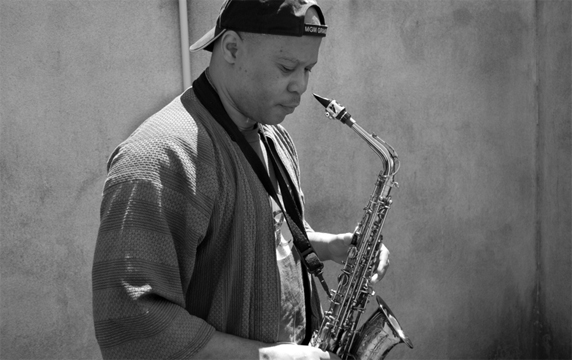Professor Steve Coleman
Control Numbers
98 (section 2): 60653
198 (section 2): 60806
298 (section 2): 60872
Units: 3
Required Texts
Harmonic Experience : Tonal Harmony from Its Natural Origins to Its Modern Expression. W. A. Mathieu. Rochester Vermont Inner Traditions Intl Ltd, 1997
*A Theory of Harmony. Ernst Levy Albany New York. State University of New York Press 1985
*Structural Set Analysis of African Music : 1-Adowa, 2-Bawa. Willie Anku. Legon Ghana. Soundstage Production
Additional Recommended Texts (at least one of the following is required)
*Applied Metaphysics : Truth and Passing Time. [from The Review of Metaphysics Vol. XIX, No. 4] Robert Brumbaugh. Boston Massetuchsets 1966
*The Melakarta Janya-Raca Scheme [diagram of 72 Melakarta formations]
(* texts may be difficult to find, excerpts may be distributed for the
purposes of the class only )
These assignments can change!
I. Course Content
This course will focus on the philosophical and theoretical implications of music improvisation. Focus will be on the recent developments of the major African-American spontaneous composers in this century, this tradition being the most extensive and accessible of the improvisation systems available today. In addition some material from the continent of Africa and the sub-continent of India will be analyzed as well as some of the approaches of the course instructor. Considerations of music philosophies from the recent and ancient cultures will also be stressed.
The primary focus will be on creativity, content and form as well as the philosophies that may have contributed in the development of these traditions. Discussions of music theory and the importance of balance and relationships in music in general and improvisation in particular will predominate. Generally speaking musical ideas will be analyzed in an attempt to discover how these concepts could have been used as a means of communication of transcendental ideas.
Finally various methods of field and scholastic research will be outlined, developed and discussed in order to help the student continue his/her investigations after the course is completed.
II. Assignments
Students will be asked to present an essay demonstrating understanding of the philosophical and theoretical aspects discussed in class with an emphasis placed on creative thinking. Towards the end of the course an exam will also be given to demonstrate theory and understanding of philosophical concepts. Throughout the course the importance of independent thinking and study will be stressed.
III. Reading Assignment weeks 1 through 3
Harmonic Experience (chapters up to discussion of the 7-limit)
Introduction to exercises designed to increase recognition of musical structures
Use of Scruti Box (drone) as an aid to hearing intervals
Introduction to basic rhythmic concepts
IV. Listening Assignments weeks 3 through 6
Excerpts from (but not limited to) some of the following artists and traditions:
Cuba
West African
South Indian
Louis Armstrong
Charlie Parker
Von Freeman
John Coltrane
Steve Coleman
V. Reading Assignment and Discussions weeks 7 through 10
Structural Set Analysis of African Music : 1-Adowa, 2-Bawa
Discussion of various rhythmic concepts from Africa, India and the Americas
Midterm assignment: paper based on material from first ten weeks of course
VI. Reading Assignment and Discussions weeks 11 through 13
Introduction to creative uses of modern techniques as aids in analysis of improvisational concepts. Involves a trip to CNMAT to discuss and demonstrate the concept of computer modeling of various musical improvisation concepts.
The Melakarta Janya-Raca Scheme
Discussions of various melodic, balance and voice-leading concepts used in improvisation
VII. Reading Assignment and Discussions weeks 14 through 16
A Theory of Harmony
Applied Metaphysics : Truth and Passing Time
Final Exam paper based on material from the entire course.
